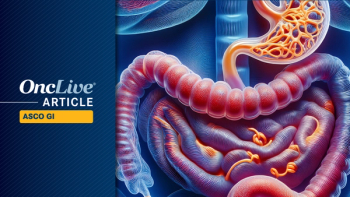
Pembrolizumab Demonstrates Long-Term OS Benefit in Advanced Melanoma
Pembrolizumab (Keytruda) provides a long-term survival benefit in both ipilimumab-naïve and ipilimumab-treated patients with advanced melanoma.
Caroline Robert, MD, PhD
Pembrolizumab (Keytruda) provides a long-term survival benefit in both ipilimumab-naïve and ipilimumab-treated patients with advanced melanoma, according to 4-year overall survival (OS) data from KEYNOTE-001 presented at the 7th European Post-Chicago Melanoma/Skin Cancer Meeting.
At 4 years, 37.3% of patients in the overall study population were still alive and median overall survival (OS) was 23.8 months (95% CI, 20.2-30.4). In ipilimumab-naïve and ipilimumab-treated patients, median OS was 29.1 months (95% CI, 22.8-39.0) and 20.2 months (95% CI, 17.8-27.1), respectively; estimated 4-year OS rates were 41.7% and 32.7%, respectively.
OS rate at 4 years was 48% in treatment-naïve patients, and the median OS duration was 41.2 months (range, 27.2-not reached). The tail of the Kaplan-Meier OS curves implied a long-term benefit for a certain fraction of pembrolizumab-treated patients.
“After this long follow-up we show that pembrolizumab continues to demonstrate a favorable tolerability and safety profile,” Caroline Robert, MD, from the Gustave-Roussy and Paris-Sud University, said during her presentation. “The CRs [complete responses] are durable, even after this additional 6 months of follow-up. Median time to obtain complete response is a little bit more than 1 year, 91% are ongoing and the median duration of response has not been reached.”
In the phase 1b multicohort KEYNOTE-001 trial, patients received 2 mg/kg or 10 mg/kg pembrolizumab every 3 weeks, or 10 mg/kg every 2 weeks until disease progression, unacceptable toxicity, or investigator decision to withdraw the patient from the trial.
Median age of the patients was 61 years (range, 18-94), 62% were male, and 68% had an ECOG status of 0. The patient population had very advanced melanoma: 78% had stage M1c disease and 38% had elevated lactate dehydrogenase at baseline. Eight percent had stable brain metastases.
More than half of patients (52%) had received prior ipilimumab and 24% were treatment-naïve. Roughly a third had received 1 line of therapy, 27% had received 2 lines of therapy, and 17% had received 3 or more lines of therapy. One-third of patients (33%) had received prior chemotherapy, and 17% had previously received a BRAF inhibitor with or without a MEK inhibitor.
At the data cutoff date of September 1, 2016, the median follow-up period was 43.3 months (range, 36.0-57.1). Investigators recorded 388 deaths (59.2%), an increase of 30 patients from the 3-year analysis. Median duration of pembrolizumab treatment was 5.6 months (range, 0.03-55.2), and 238 (36.3%) patients remained on pembrolizumab for longer than 12 months. At the time of data cutoff, 104 (15.9%) patients were either still receiving pembrolizumab (n = 47) or had discontinued treatment due to experiencing complete response (n = 57).
The disease control and CR rates remained the same at 4 years when compared with the 3-year analysis, with a slight increase in the overall response rate at 4 years (34% vs 33%). Overall, 105 (16%) patients had a CR. Of those, 13% remained on pembrolizumab, 23% discontinued pembrolizumab due to adverse events (AEs), progressive disease or other reasons, and 64% stopped pembrolizumab to undergo observation.
In the complete responders who stopped pembrolizumab to undergo observation, median time to CR was 13 months (range, 3-36), and 91% of these responses were ongoing at the time of this analysis. Median CR duration has not yet been reached. Four (6%) of these patients experienced progressive disease, all of whom received further pembrolizumab treatment. Three of these patients continued to have progressive disease and one patient receiving second-line pembrolizumab had a partial response.
Compared with the previous analysis at 3 years, there was no increase in grade 3 or 4 AEs in the overall population at data cutoff (17% at both time points), nor did any additional patients discontinue treatment. There was a slight increase in the numbers of patients with hypothyroidism, hyperthyroidism and colitis at 4 years.
Long-term outcomes in patients (Pts) with advanced melanoma treated with pembrolizumab (Pembro): 4-year overall survival (OS) results from KEYNOTE-001. 7th European Post-Chicago Melanoma/Skin Cancer Meeting; June 29-30, 2017; Munich, Germany. Abstract 8.



































